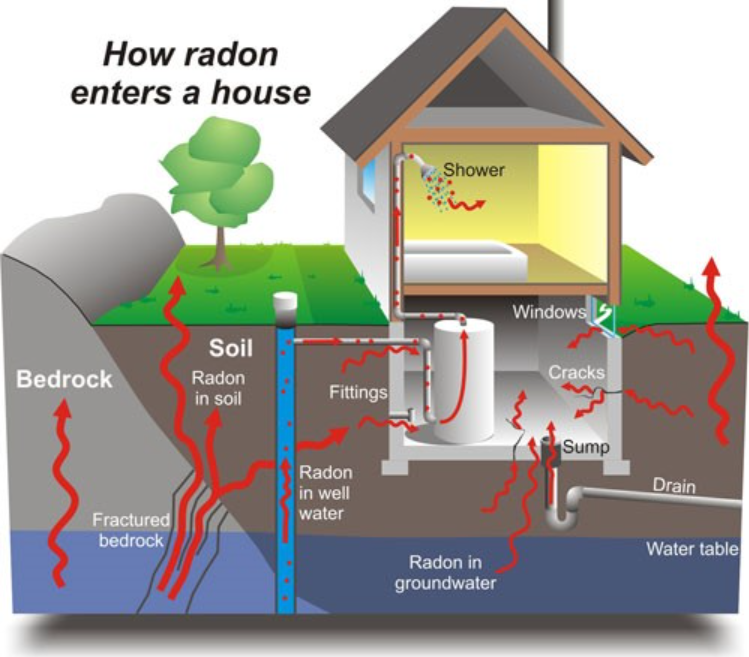Radon
Last review/updated: November 7, 2024
Radon is a naturally occurring, radioactive gas that comes from the breakdown of uranium found in rocks and soil. You can’t see, smell, or taste radon. When outside, radon does not usually cause health issues because it can disperse in the air. But when radon seeps into confined spaces like a house, it can build up to high levels and become harmful.
What are the health effects?
When a radioactive gas like radon is inhaled, radioactive particles can get trapped in your lungs. This damages lung tissue and over many years, can develop into lung cancer. The health risk from radon exposure is long term and often dependent on three things:
- the level of radon in your home,
- the length of time (in years) you have been exposed, and
- smoking habits or exposure to secondhand smoke.
In Canada, radon is the second leading cause of lung cancer (after tobacco smoke). People who smoke have an even higher likelihood of developing lung cancer from radon than non-smokers. You can read more about the health effects of radon from the Canadian Lung Association.
Is there radon in my home?
Every house likely contains some radon. The likelihood of high radon levels cannot be predicted by the age or location of a home. The only way to know how much radon is in your home is to test. Health Canada recommends radon levels be below 200 becquerels per cubic metre (200 Bq/m3).
How does radon get into my home?
Radon can enter buildings through cracks in the foundation, gaps around pipes, open floor drains or any other area of exposed soil. Well water can also contain radon, which can be released into the air when water is drawn.

© Department of Natural Resources Canada. All rights reserved.
What can I do?
The only way to know your home’s radon gas level is to test for it. Testing is simple! Radon testing kits can be borrowed for free from Peterborough Public Library. Radon detectors can also be purchased from Take Action on Radon. You can also hire a certified Canadian radon testing company to test and mitigate radon levels.
Health Canada recommends indoor air radon levels be below 200 becquerels per cubic metre (200 Bq/m3). If a long-term (3-6 months) radon detection test determines your home to be above that level, consult a certified radon professional (1-855-722-6777). Levels above 600 Bq/m3 should be remediated within one year; levels between 200 and 600 Bq/m3 should be remediated within two years.
In Ontario, newly built homes have a 7-year warranty for radon remediation. If levels are above the guidelines set by Health Canada (200Bg/m3), this warranty should cover remediation costs.
Resources
- A Homeowner’s Guide to Radon – Canadian Real Estate Association
- Resources for Homeowners – Take Action on Radon
- For Homeowners – Canadian Association of Radon Scientists and Technologists
- Radon – Canadian Cancer Society (Factsheet, 2016)
- Reducing Radon – Canadian Partnership For Children’s Health and Environment
- Radon – CARex (Carcinogen Exposures) Canada
- Radon – Health Canada
- Evict Radon: Action, Empowerment, and Education
For Health Professionals
- Accredited Radon Course for Health Care Professionals – MacHealth
- Infographic – Take Action on Radon
- Info for Healthcare Providers – Take Action on Radon
- Various Resources – Take Action on Radon
- Radon Reduction Guide for Canadians – Health Canada
- Radon: Is It In Your Home? – Health Canada (FR Version)
- Radon: Another Reason to Quit – Health Canada
- Radon: It’s Your Health – Health Canada
Pamphlets can be ordered in bulk from Health Canada by emailing radon@canada.ca

